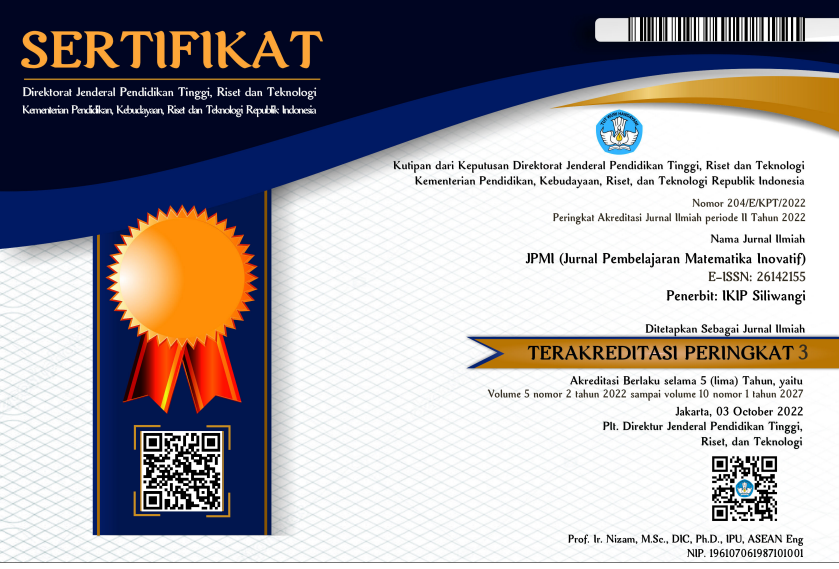Pengembangan soal matematika tipe PISA konten quantity menggunakan konteks kopi khas Jambi untuk siswa SMP
DOI:
https://doi.org/10.22460/jpmi.v8i3.27081Keywords:
Development Research, Jambi Specialty Coffee Context, Mathematical Literacy Skills, PISA Problem, Quantity ContentAbstract
The low mathematical literacy ability is the background of this study. The aim is to create PISA type mathematics questions with quantity content using the context of Jambi's specialty coffee that are valid, practical, and have a potential effect on mathematical literacy skills. The study method used is the design research model development studies, namely preliminary, prototyping with a series of formative evaluation stages including self-evaluation, expert review, one to one, small group, and field test and assessment phase. The study subjects were 29 students of class VIII SMP N 22 Jambi City. Data were obtained using walk through, tests, questionnaires and interviews. This study presents PISA type mathematics questions with quantity content, especially the topic of comparison. The context is personal, namely Jambi's specialty coffee. The questions produced are included in the reasoning level category. The questions produced are valid and easy qualitatively and have a potential effect on mathematical literacy skills. In addition, by linking mathematics questions to contexts known to students, such as Jambi coffee, it makes it easier for students to understand abstract mathematical concepts.
References
Adha, I., & Refianti, R. (2019). Pengembangan lembar kerja siswa (LKS) menggunakan pendekatan matematika realistik Indonesia berbasis konteks Sumatera Selatan. Jurnal Pendidikan Matematika (JUDIKA EDUCATION), 2(1), 1–10. https://doi.org/10.31539/judika.v2i1.729
Akker, J. V. D., Bannan, B., Kelly, A. E., Nieveen, Nienke., & Plomp, Tjeerd. (2013). Educational Design Research. SLO.
Baka, T. A., Laksana, D. N. L., & Dhiu, K. D. (2018). Konten dan konteks budaya lokal ngada sebagai bahan ajar tematik di sekolah dasar. Journal of Education Technology, 2(2), 46–55. http://dx.doi.org/10.23887/jet.v2i2.16181
Charmila, N., Zulkardi, Z., & Darmawijoyo, D. (2016). Pengembangan soal matematika model PISA menggunakan konteks Jambi. Jurnal Penelitian Dan Evaluasi Pendidikan, 20(2), 198–207. https://doi.org/10.21831/pep.v20i2.7444
Gustiningsi, T. (2016). Pengembangan soal pengayaan model PISA level 4 kelas VII SMP. Jurnal Pendidikan Matematika JPM RAFA, 2(2), 198–213. http://jurnal.radenfatah.ac.id/index.php/jpmrafa/article/download/1248/1041
Gustiningsi, T., & Utari, R. S. (2020). Developing of higher order thinking skill (HOTS) mathematical problems with cartesian coordinate material. AdAdvances in Social Science, Education and Humanities Research, 513, 561–566. http://dx.doi.org/10.2991/assehr.k.201230.163
Hidayah, A. R. (2020). Kemampuan literasi matematis siswa dalam menyelesaikan soal PISA ditinjau dari gaya belajar visual. Jurnal Karya Pendidikan Matematik, 7(1), 6–13. http://jurnal.unimus.ac.id/index.php/JPMat/index
Mahdiansyah, & Rahmawati. (2014). Analisis menggunakan desain tes internasional dengan konteks Indonesia. Jurnal Pendidikan Dan Kebudayaan, 20, 452–469. https://doi.org/10.24832/jpnk.v20i4.158
Mayari, R. P., Yuli, F., & Muslimahayati. (2022). Pengembangan soal matematika model PISA menggunakan kontek palembangan. Mathematic Education Journal)MathEdu, 5(1), 131–139. http://journal.ipts.ac.id/index.php/
Noviana, K. Y., & Murtiyasa, B. (2020). Kemampuan literasi matematika berorientasi PISA konten quantity pada siswa SMP. Jurnal Nasional Pendidikan Matematika), 4(2), 195–211. https://doi.org/10.33603/jnpm.v4i1.2830
Nusantara, D. S., Zulkardi, & Indra Putri, R. I. (2024). How to design PISA-like digital mathematics problems: A preliminary Study. AIP Conference Proceedings, 3046(1), 1–8. https://doi.org/10.1063/5.0194756
Nusantara, D. S., Zulkardi, & Putri, R. I. I. (2020). Designing PISA-like mathematics problem in covid-19 pandemic (PISAComat). Journal of Physics: Conference Series, 1657(1), 1–8. https://doi.org/10.1088/1742-6596/1657/1/012057
Nusantara, D. S., Zulkardi, & Putri, R. I. I. (2021). Designing pisa-like mathematics task using a COVID-19 context (Pisacomat). Journal on Mathematics Education, 12(2), 349–364. https://doi.org/10.22342/JME.12.2.13181.349-364
OECD. (2017). PISA 2015 Assessment and Analytical Framework. OECD. https://doi.org/10.1787/9789264281820-en
OECD. (2019). PISA 2018 Assessment and Analytical Framework. OECD. https://doi.org/10.1787/b25efab8-en
OECD. (2023a). PISA 2022 Assessment and Analytical Framework. OECD. https://doi.org/10.1787/dfe0bf9c-en
OECD. (2023b). PISA 2022 Results Factsheets Indonesia PUBE. https://oecdch.art/a40de1dbaf/C108.
OECD. (2024). PISA 2022 Technical Report. OECD. https://doi.org/10.1787/01820d6d-en
Pasaribu, F. T., Saputra, W., Agustinawati, P. L., Afifah, N., Program, ), Matematika, S. P., Keguruan, F., Pendidikan, I., & Jambi, U. (2022). Desa cendikia sebagai program pengembangan kemampuan literasi masyarakat desa Rantau Puri. Communnity Development Journal, 3(3), 1979–1986. https://doi.org/10.31004/cdj.v3i3.9549
Putri, D., & Warmi, A. (2022). Kemampuan pemecahan masalah matematis siswa dalam menyelesaikan soal PISA matematika pada konten bilangan. Jurnal Penelitian Pembelajaran Matematika, 15(1), 138–152. https://dx.doi.org/10.30870/jppm.v15i1.14102
Rawani, D. (2021). Pengembangan soal matematika tipe PISA konten space and shape. PRISMA, 10(2), 193–207. https://jurnal.unsur.ac.id/prisma
Rizta, A., Zulkardi, Z., & Hartono, Y. (2013). Pengembangan soal penalaran model TIMSS matematika SMP. Jurnal Penelitian Dan Evaluasi Pendidikan, 17(2), 230–240. https://doi.org/10.21831/pep.v17i2.1697
Rosdiana. (2020). CV. NEFO CAP AAA 1966-2010. Jurnal Istoria, 4(1), 51–60. http://dx.doi.org/10.33087/istoria.v4i1.77
Sari, Y. P., Zulkardi, Z., & Putri, R. I. I. (2023). The development of numeracy problems using light rail transit context. Jurnal Elemen, 9(1), 227–245. https://doi.org/10.29408/jel.v9i1.6923
Sepriliani, S. P., Zulkardi, Z., Putri, R. I. I., Samsuryadi, S., Alwi, Z., Meryansumayeka, M., Jayanti, J., Nusantara, D. S., Sistyawati, R. I., Tanjung, A. L., Aprilisa, S., & Pratiwi, R. P. (2022). The development of PISA-based numerical problem using the context of religious day during the pandemic. Jurnal Pendidikan Matematika, 16(2), 157–170. https://doi.org/10.22342/jpm.16.2.16010.157-170
Stacey, K., & Turner, R. (2013). Assessing Mathematical Literacy The PISA Experience.
Wardani, A. K., Zulkardi, Z., Hartono, Y., & Sriwijaya, U. (2017). Pengembangan soal matematika model PISA level 5 untuk program pengayaan SMP. Jurnal Pendidikan Matematika RAFA, 3(1), 1–18. http://repository.unsri.ac.id/id/eprint/108513
Zulkardi, Nusantara, D. S., & Putri, R. I. I. (2021). Designing PISA-like task on uncertainty and data using Covid-19 context. Journal of Physics: Conference Series, 1722(1), 1–6. https://doi.org/10.1088/1742-6596/1722/1/012102
Zulkardi, Z. (2002). Developing a learning environment on realistic mathematics education for Indonesian student teachers. https://www.researchgate.net/publication/254858875.
Downloads
Published
Issue
Section
License

This work is licensed under a Creative Commons Attribution-ShareAlike 4.0 International License.
The author is responsible for acquiring the permission(s) to reproduce any copyrighted figures, tables, data, or text that are being used in the submitted paper. Authors should note that text quotations of more than 250 words from a published or copyrighted work will require grant of permission from the original publisher to reprint. The written permission letter(s) must be submitted together with the manuscript.
















